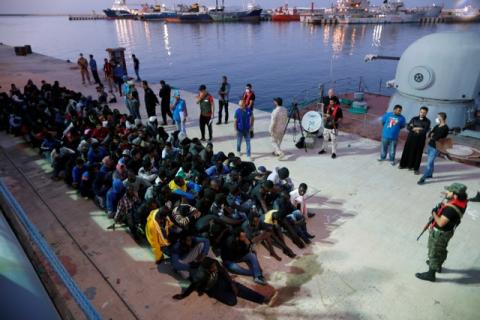Advertisement
Bolstered Libyan coast guard intercepts packed migrant boat
TRIPOLI (Reuters) - Libya's European-backed coast guard on Saturday turned back more than 150 migrants trying to reach Italy by boat amid its heightened efforts to block such crossings of the Mediterranean.
The migrants, packed into a single rubber boat, were intercepted off the coast between the towns of Al Khoms and Garabulli, east of Tripoli, after traveling through the night.
The boat was close to an Italian coast guard ship patrolling in international waters when they were cut off and taken aboard a Libyan vessel, dashing their hopes of reaching Europe.
The rubber boat was being rocked by heavy waves and the motor had cut out.
"We were shouting, 'they are blocking us, they are blocking us'. We were crying, pleading for help," said Patrice Emani, a 27-year-old from Mali.
He said he was making his second attempted crossing from Libya. He was detained in the western Libyan city of Zawiya earlier in the year, but his family paid for him to be released.
The captain of the Libyan ship that returned the migrants to Tripoli port, Colonel Abdelhamid Adengouz, said they had been rescued from drowning in rough conditions, with cooperation from Italy.
"The migrants were saved from death," he said. "There was an Italian ship present that helped us."
A large majority of migrants traveling to Europe by sea depart from western Libya, where people smuggling has flourished amid lawlessness and a collapsing economy.
But there has been a sharp drop in departures since July due to armed factions preventing boats from leaving parts of the coast and increased activity from Libyan coast guard units which have received training and technical support from Italy and the European Union.
Human rights groups have criticized European policy, saying no migrants should be returned to a country where they face widespread abuse.
After migrants are brought back to Libya, they are registered by international agencies before being taken to overcrowded detention centers. Some are offered the chance to return home, while others languish in detention or seek a way out.
Most of those intercepted on Saturday were from West African countries, including Mali, Guinea, and Nigeria, and some were from Bangladesh. All but one were male.
They said they had paid between 1,500 and 3,000 Libyan dinars ($176-$353 at unofficial market rates) to make the crossing.
"I suffered a lot - kidnappings, demands for ransom," said Christopher Daniel, a 20-year-old Nigerian. "They blindfolded me and forced me to give them money," he said of a period he spent in captivity in the southern city of Sabha last year.
"I don't know what to say or do. All the money I have wasted - what will I tell my parents?"
(Additional reporting by Hani Amara, editing by G Crosse)



















Add new comment